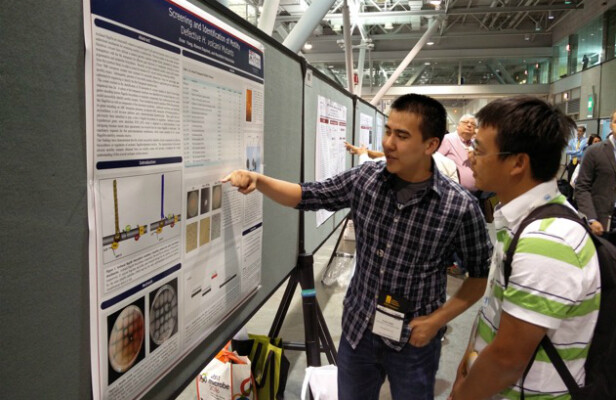Studying a Salt-loving Microbe, Penn Senior Evan Yang Imagines Life on Mars
By Niharika Gupta and Katherine Unger Baillie
NASA's long search for life on Mars came to a thrilling turning point with the recent discovery of liquid water on the planet. One undergraduate researcher at Penn aims to understand how microbial life could thrive in such extreme, even extraterrestrial environments.
Evan Yang, a senior at the University of Pennsylvania who is double majoring in biology and biochemistry, started his journey in microbiology the summer after his freshman year. Through the Penn Undergraduate Research Mentoring Program, which supports undergraduate involvement in faculty research, Yang began working in the lab of Mecky Pohlschröder, a professor in Penn’s Department of Biology.
“It was clear that Evan had so much enthusiasm for science and that to me is always the key," Pohlschröder says. "If students are excited about science, whether or not they have the experience doesn't matter as much. They can learn very quickly."
Yang’s interest in science was nurtured as a high school student at Northeast Philadelphia’s Math, Science and Technology Community Charter School. His biology teacher at the time, Paul Nuzzi, took students on improvised “nature” walks, even while still in the city, and encouraged them to apply knowledge consumed in the classroom to the outside world.
“Mr. Nuzzi was one of the teachers who put in extra effort and made class really interesting,” Yang says. “If it weren’t for him, I don’t think I would be interested in science at all.”
At Penn, Yang followed his teacher’s advice, looking for opportunities to engage with the material he absorbed during lectures through real-world research and applications.
The project in Pohlschröder’s lab, working closely with former graduate student Rianne Esquivel, presented precisely that kind of opportunity.
“I had just been learning about transposon mutagenesis in my Biology 121 class, and the PURM project used that same technique,” Yang says.
Transposon mutagenesis is a natural process by which pieces of DNA “jump” around the genome and cause mutations. Transposons can also be harnessed by researchers as a tool to purposefully mutate an organism’s genome in order to identify the function of different genes.
Yang’s project took this approach in order to identify and characterize genes responsible for how single-celled microorganisms called archaea move, a relatively unexplored area of microbiology research and one in which Pohlschröder’s team specializes.
Supported by funding from NASA, the Pohlschröder lab investigates proteins that confer stability, facilitate motility and mediate adherence to surfaces in the archaeal species Haloferax volcanii. H. volcanii, which was originally isolated from the Dead Sea, thrives in extremely salty environments and can tolerate high levels of ultraviolet and gamma radiation, conditions that happen to also be found on Mars.
"H. volcanii is ideal for identifying mechanisms that might allow microbes to prosper in Mars-like environments," says Pohlschröder.
Over the three years he has worked in the lab, Yang has identified a highly diverse set of H. volcanii mutants that have lost the ability to swim, demonstrating the complexity of the cellular process that allows cells to move toward nutrients and escape from stressful environments.
"I’ve characterized a few of these mutants to figure out what role they play in motility," Yang says. “Right now I’m focusing on a mutant that not only has impaired motility but also cannot form biofilms, cell aggregates that prokaryotes form to protect them from stressful environments similar to those exhibited on Mars.”
Yang’s research in the Pohlschröder lab has helped further the scientific community’s understanding of this little-understood domain of microbial life.
In the spring of 2015, the American Society for Microbiology awarded Yang an Undergraduate Research Fellowship, which supported his research with Pohlschröder last summer at Penn. He received a $4,000 grant and a two year ASM student membership, and a travel grant to attend and present at the ASM Microbe Meeting this past June in Boston, Mass. He also participated in ASM’s Research Capstone Institute training workshop preceding the conference to improve his presentation skills and help him navigate the conference, which had an attendance of more than 10,000.
Yang was one of just 12 undergraduate students to have received the ASM URF award, which is intended to promote a deeper understanding of microbial sciences.
As he begins his senior year at Penn, Yang is looking ahead to a future career in medicine, one that he believes may still find him with a hand in research.
“I’ve seen how science-backed medicine can really make a difference in people’s lives,” Yang says. “Right now I’m open to just about everything.”







